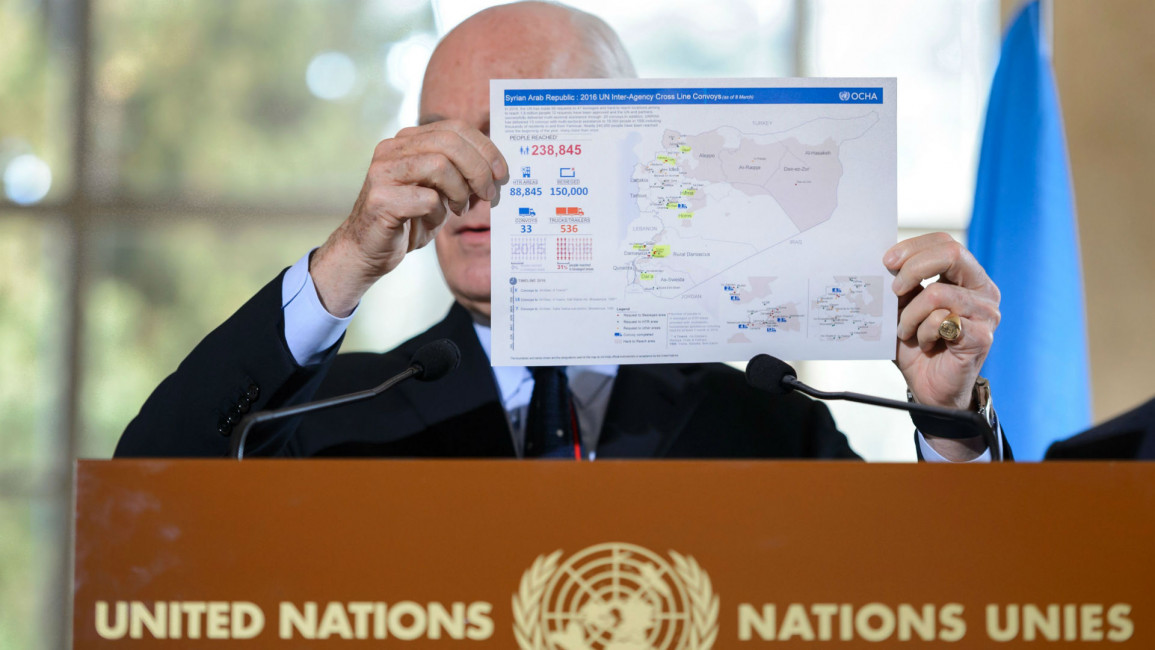
Why has the international community failed Syria?
For the past five years, the world has watched in horror as humanitarian and human rights law have been broken again and again in Syria.
Chemical weapons, indiscriminate bombing against civilians, the targeting of civilian infrastructures - such as hospitals and schools - the detention, torture and forced disappearance of thousands of political dissenters, the sexual trafficking of young women, and illegal sieges that cut civilians off from basic necessities such as food, water and electricity.
In these five years, more than 200,000 people have been killed, an overwhelming majority of whom were killed by Syrian government forces loyal to Bashar al-Assad. And this figure is a conservative estimate because the UN stopped counting the death toll in early 2014.
Why has this been allowed to happen? Many, especially Syrians, are asking.
In short, it's been allowed to happen because the World Order, as organised under the UN system, is not primarily concerned with people. It is a global system organised on the principle that the interests of states, not people, are paramount.
This is not to say that there aren't a lot of good people working to push human rights and humanitarian interests forward on the international level. It just means that these few good men and women are significantly disadvantaged in how they are able to conduct their work.
 |
This flaccidity can be attributed to the two main factors upon which the international system was built |  |
They are often understaffed, underfunded, and significantly overwhelmed with work. In addition, the frameworks for the institutions they work within are set up so as to minimize their own impact. For example, the UN Office for the Coordination of Humanitarian Affairs (OCHA) is not able to receive sufficient funding to actually address all of the humanitarian needs occurring in Syria - yet alone other parts of the world.
The UN Office of the High Commissioner for Human Rights cannot hold any state accountable for even the most egregious human rights violations. It can only comment on them.
This flaccidity can be attributed to the two main factors upon which the international system was built.
First, that the Security Council, which has only 15 members, five of which are permanent and hold a veto, wields an inordinately disproportionate amount of power.
This includes the power to authorise the use of force, refer prosecutions to the International Criminal Court, impose sanctions, and create binding resolutions to which all member states must adhere.
In theory, the Security Council was meant to maintain world order. In practice - and in its ulterior design - its purpose is to ensure that the five major world powers (the United States, Great Britain, France, Russia and China) remain the major world powers as the only permanent members with the power to veto any resolution, while allowing for a rotation of 10 other states at any given moment to participate in making some of the world's major decisions.
This has had dire consequences for adherence to human rights and humanitarian law in conflict zones, particularly where a conflict zone is of interest to a Security Council Member. In the context of Syria, Russian interests have resulted in block after block of any action that seeks to hold the Assad regime accountable, or to establish effective protection and accountability mechanisms - such as a no-fly zone or referrals to the International Criminal Court - or to ensure peace talks that start with a level playing field for the opposition.
Unfortunately, it is not the first time that the Security Council has been complicit in atrocities. Let us not forget that in 2003, it looked the other way when the United States committed an overt act of aggression against Iraq, leading to the deaths of more than a million people and the fragmentation and failure of the state itself.
And in 1994, because of French interests in Rwanda, it closed its eyes to the slaughter of close to two million Tutsis and moderate Hutus.
The second factor is the underlying principle upon which the UN system operates, and that is that the UN is an institution that represents state interests. The old-world guiding principal of diplomacy.
 |
Does not a system based exclusively on states' interests seem archaic? |  |
The assumption being that each state is equal in its sovereignty, and is ultimately responsible for the control and protection of the people within its borders. But in a world where territorial boundaries seem to be shifting and fading, where states can and have directly intervened in the affairs of other states, and where individuals and civil society organisations can move and affect change internationally or across borders (both in good and bad ways), does not a system based exclusively on states' interests seem archaic?
How can the UN claim to keep up with the rapidly changing needs of the world, and mitigate against man-made disasters such as is happening in Syria, if it continues to operate on the principle that human beings are second to the interests of the state?
The result is that crises today are spiralling out of control, and the international community seems unable to keep up. If the world is to change, if we are to better the way that we respond to crises, then our institutions must change to more adequately reflect the realities of the world in which we live.
Otherwise, the international community will continue to be 10 steps behind in addressing crises.
Christina Abraham is an attorney that focuses on civil rights, human rights, immigration/migration, and labour rights. Follow her on Twitter: @christinaabe
Opinions expressed in this article remain those of the author and do not necessarily represent those of The New Arab, its editorial board or staff.




